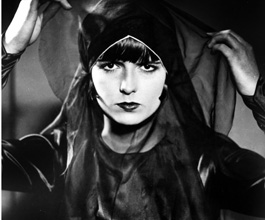home | metro silicon valley index | movies | essay
Cinequest 2007:
Complete coverage index | M Dot Strange | Capsule reviews | Week 2 guide | Louise Brooks | 'Blood Car'

Femme fatale: Louise Brooks still exerts a strange power on filmgoers 80 years later.
Little Lulu
Cinequest looks back at Louise Brooks, one of silent cinema's sexiest sirens
By Richard von Busack
THE GREATEST STARS could be summed up in a few strokes of ink, as if by calligraphy. In Louise Brooks' case, one sketches the crescents of her gleaming black hair: the locks, like twin scythes, accentuating the points of her bitter half-smirk; a few slashes indicating the bright and heartless eyes, half closed under dark and level brows.
Her best-known film, 1929's Pandora's Box (which screens Friday at Cinequest) is a bizarre movie in which its star labors under a stodgy director (G.W. Pabst) and a plot squished together from a pair of plays. What transpires is the adventures of a very bad girl on her way down the drain. In one instance, Lulu is close-dancing with a big-shouldered blonde lesbian; in another, she's dating a noted serial killer. In yet another, she's wrecking the career of a German cabinet minister. At other times, she narrowly avoids being shipped off to a Cairo brothel.
As in Chicago, she is the lover of a man who happens to be shot by a pistol that she happens to be holding. In the courtroom, she almost flirts her way out of the noose by turning up adorably swathed in satin—at least it's black satin, for mourning. There is naturally a price to be paid for all these misadventures. Lulu dooms herself with a sportive act of generosity, perhaps the first in her life.
Pabst tries to give this lady a little credit: a "There, for the grace of God, goes your spouse" title card is missing on some prints, though. The line actually reads, "Mr. Prosecutor, I wonder what your wife would have become, if she had to walk into cabarets every night as a child!" There's a chance—only a chance—that Lulu is a victim of circumstance. Had she been raised by a less-deviant parent than her procurer, Schigolch (an amusingly decrepit Carl Goetz), she might have grown up to be a better and far more boring person. Any implication that she's society's quarry, rather than society's prey, has to face up to the Greek legend in the film's title. Unlike so many bad girls in today's movies, at least Lulu chooses her path of destruction.
Many girl vampires populated the silent cinema. The coltish Brooks, 23 in the film, was the freshest of the lot. In an era of gesticulators, writhers and breast beaters, Brooks was as brilliantly impassive as her fellow Kansan, Buster Keaton. (For what it's worth, Brooks, this epitome of the exotic women men both desire and dread, was born about 30 miles from Laura Ingalls Wilder's Little House on the Prairie.) No can rhapsodize like pioneering German film critic Lotte Eisner: "Is this still a woman—a human being—at all? Is it not rather the flower of some poisonous plant?" Pressed into nigh-80-year-old celluloid, this long-stemmed flower still has enough aroma left to intoxicate a viewer.
![]() Pandora's Box plays Friday, March 9, at 7pm at the California Theatre;
Dennis James accompanies the film on the Wurlitzer.
Pandora's Box plays Friday, March 9, at 7pm at the California Theatre;
Dennis James accompanies the film on the Wurlitzer.
Send a letter to the editor about this story.
|
|
|
|
|
|